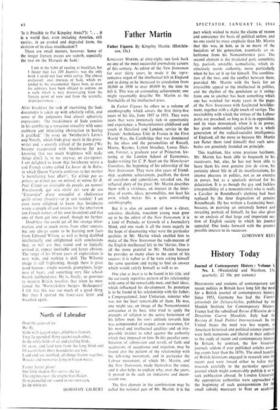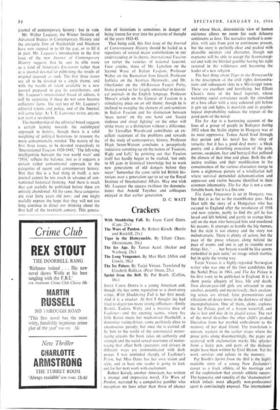History Today
HISTORIANS and students of contemporary and recent politics in Britain have long felt the need for a British journal of contemporary history. Since 1953, Germany has had the Viertel- jahresheft fiir Zeitgeschichte, published by the Munich Institute for Contemporary History. France had the subsidised Revue d'Histoire de la Deuxieme Guerre Mondiale. Italy had the Revista di Studi Politici Internazionali. In the United States the need was less urgent, as American historical and political-science journals were both numerous and liberal in their attitude to the study of recent and contemporary history. In Britain, by contrast, the few historical journals seldom if ever published articles cover- ing events later than the 1870s. The small handful of British historians engaged in research into the recent past were forced either to tailor their research carefully to the particular specialist journal which might conceivably publish it or.to seek publication abroad. In London Universill the appropriate authorities were approached the beginning of each quinquennium for small subsidy necessary to float an academg
journal of contemporary history : but in vain.
Mr. Walter Laqueur, the Wiener Institute of Advanced Studies in Contemporary History and the energetic firm of Weidenfeld and Nicolson have now stepped in to fill the Rap; or to fill it in part. Mr. Laqueur's introduction to the first issue of the new Journal of Contemporary History suggests that he sees its role more as a kind of historian's Encounter rather than as a journal devoted to publishing the results of original research as such. The first three issues are all to be devoted to a single theme; and with the wealth of talent available to a new journal prepared to pay its contributors, and Mr. Laqueur's international board of editors, it will be surprising if these do not soon become collectors' items. The real test of Mr. Laqueur's editorial talents and policy, and of the Journal, will come later. As T. E. Lawrence wrote, anyone can start a revolution.
The membership of the editorial board suggests a certain leaning towards the sociological approach to history, though there is a solid weighting of political historians to reassure the more conventionally minded. The nature of the first three issues, to be devoted respectively to 'International Fascism 1920-1945,"The left-wing intelligentsia between the two world wars' and '1914; reflects the balance; just as it suggests a certain rather conventional approach to the categories of recent and contemporary history. Not that this is a bad thing in itself; a new journal cannot be too much in advance of con- ventional historical thinking. And there is much that can usefully be published before these are entirely abandoned. All the same, these categories are over forty years old now; and one might usefully express the hope that they will not too lone continue to direct our thinking about the first half of the twentieth century. This genera-
tion of historians is sometimes in danger of being frozen for ever into the patterns of thought of the years 1933-45.
That being said, this first issue of the Journal of Contemporary History should be hailed as a repository of several major contributions to our understanding of its theme, international Fascism (or rather the varieties of national fascism). Four articles, those of Mr. Lyttelton on the Second Wave of Italian Fascism, Professor Weber on the Rumanian Iron Guard, Professor Jedlicka on the Austrian Heimwehr, and Dr. Oberkinder on the All-Russian Fascist Party, broke ground so far largely untouched in histori- cal journals in the English language. Professor Mosse's article on the Genesis of Fascism is a stimulating piece on an old theme; though he is inclined to overplay the element of anti-semitism in Italian Fascism and his distinction between 'mass terror' on the one hand and `fascist violence and street fighting on the other will strike many as a distinction without a difference.
Sir Llewellyn Woodward contributes an ex- cellent statement of the problems and rewards of the study of contemporary history. Professor Hugh Seton-Watson concludes a perceptively indecisive summing-up on the nature of 'Fascism, Right and Left,' by pointing out that Fascism itself has hardly begun to be studied, 'not only to fill gaps in historical knowledge but to warn new generations of old dangers before they recur.' Somewhat the same spirit led British his- torians over a generation ago to set up the Royal Institute of International Affairs. May one wish Mr. Laqueur the success (without the denuncia- tions) that Arnold Toynbee and colleagues enjoyed in that earlier generation.
D. C. WATT



































 Previous page
Previous page